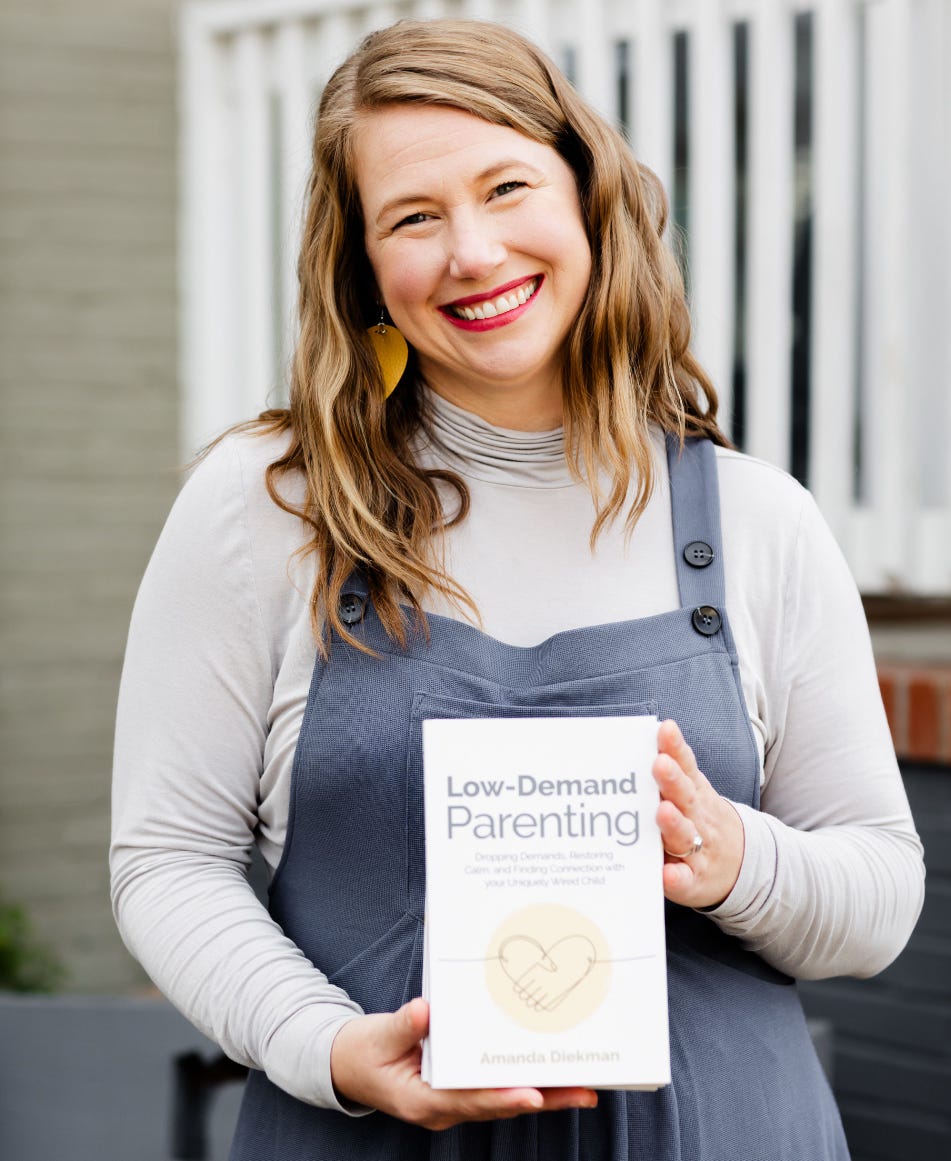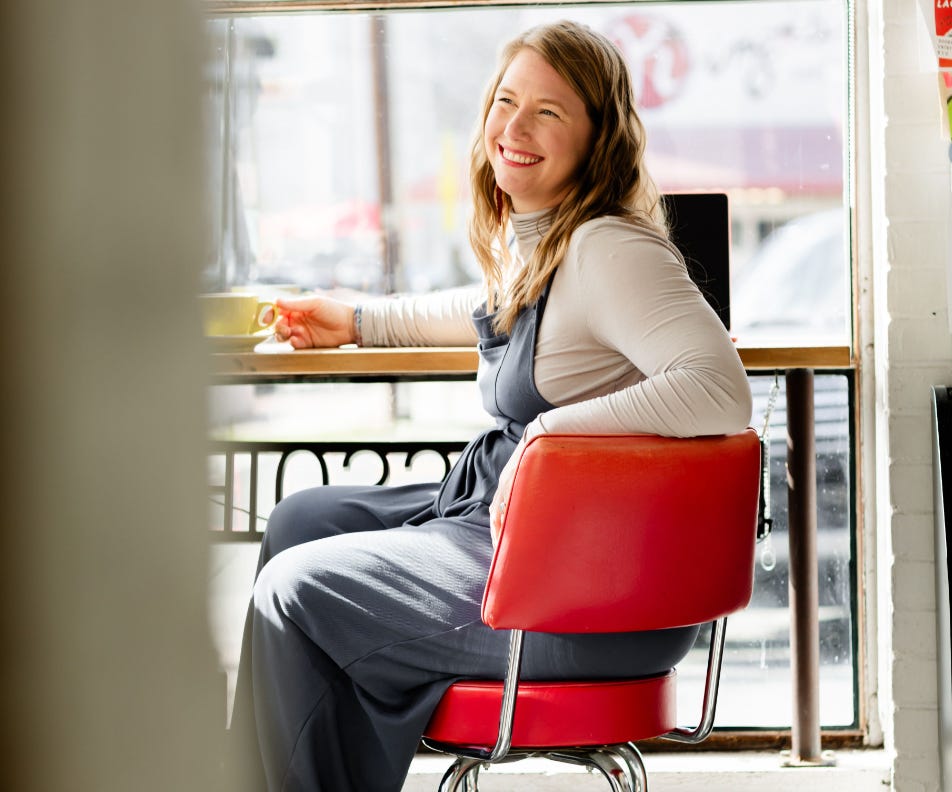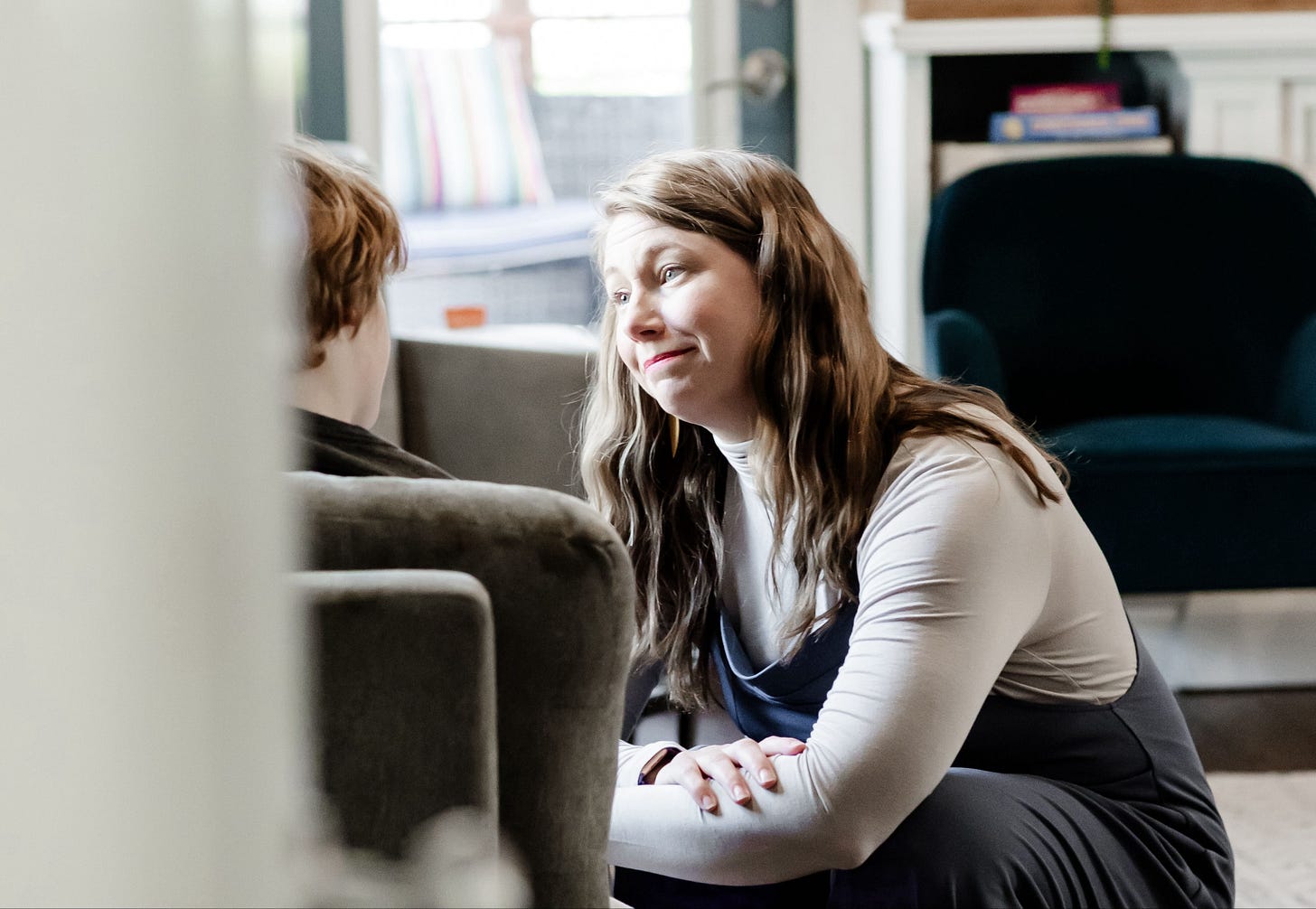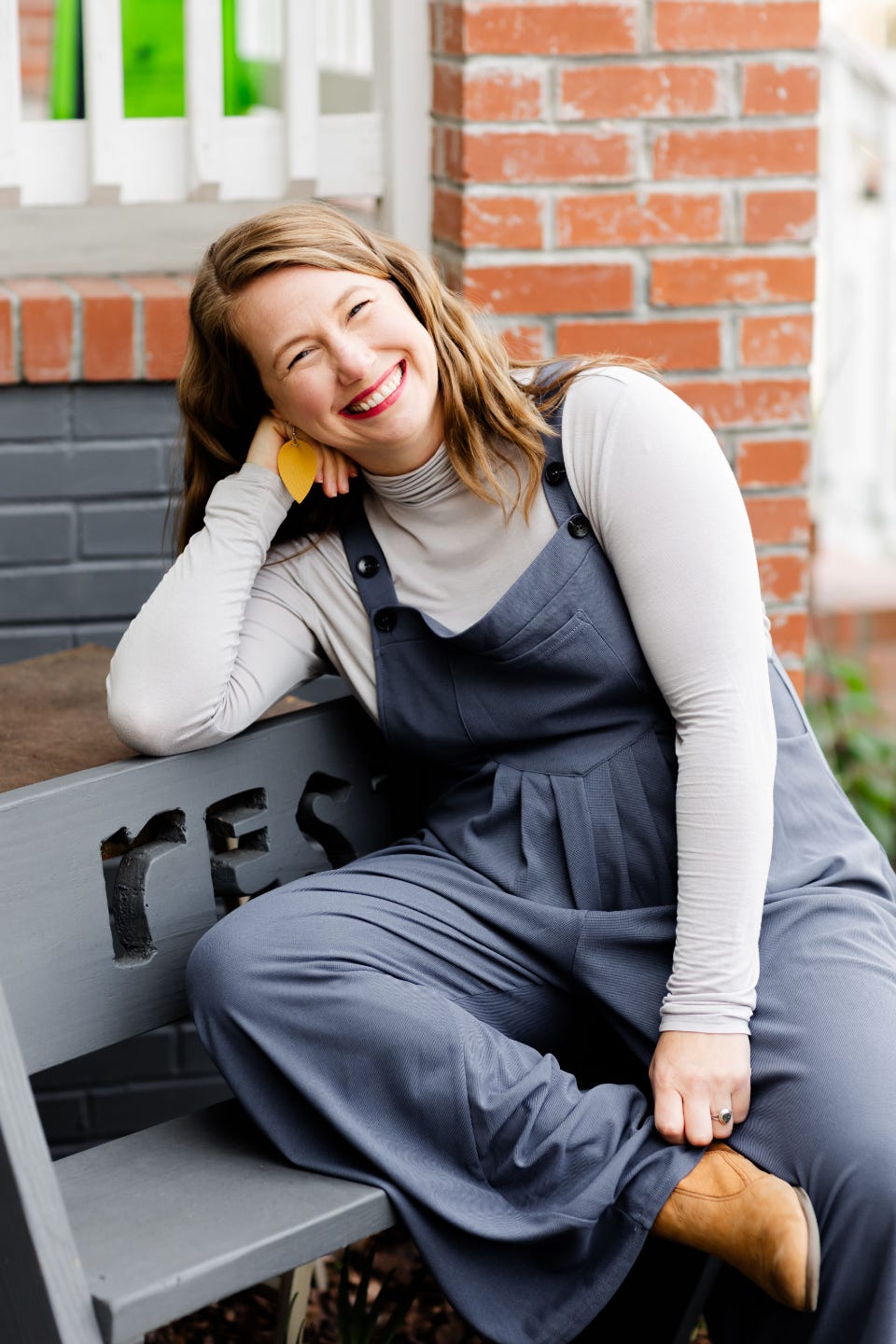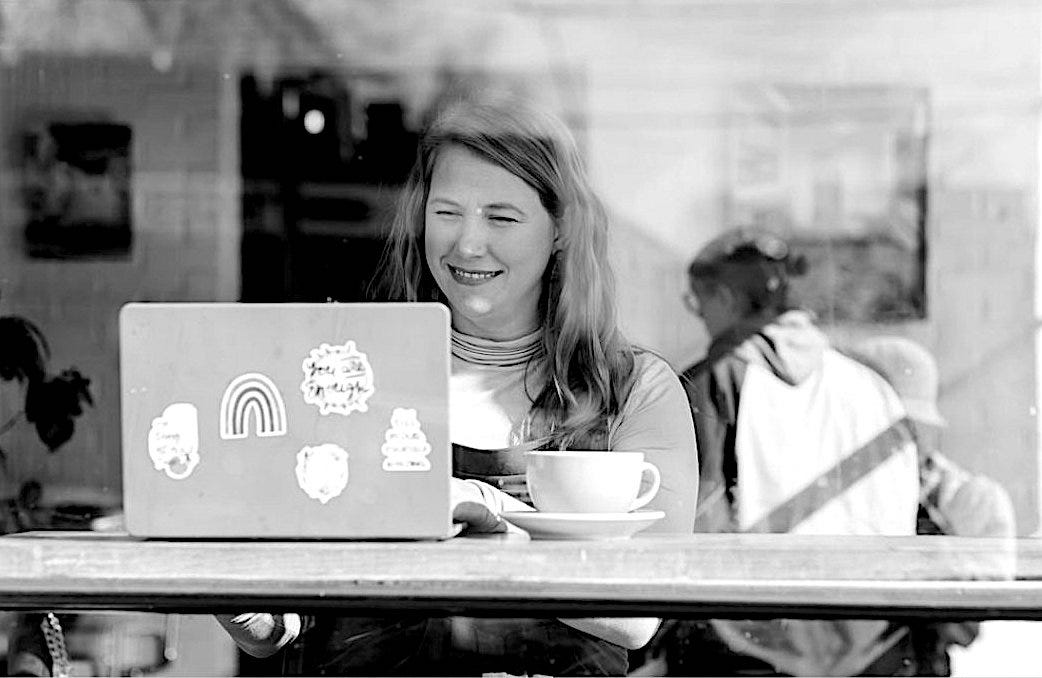Hey guys. I'm so excited to share today's interview with you. I'm talking to Amanda Diekman, the author of Low-Demand Parenting.
My friend, Jacqui recently introduced me to Amanda's work because I've been super curious about PDA, Pathological Demand Avoidance. It’s a profile typically associated with high masking autistics…
However, I'm starting to encounter this profile coinciding with some ADHDers in my personal life, along with some coaching clients.
I am so excited that Amanda reached out and offered to share her wisdom around low demand parenting, which is such a supportive approach to this profile. If you are not familiar with Amanda and her work, you are in for a treat.
What is Low-Demand Parenting?
Amanda: I'll tell a quick story and then I'll define it.
When I went to the grocery store with my three kids (aged 4, 2, and 0) I had fully absorbed what I would consider dominant gentle parenting. It's kind of a mishmash of popular culture and what my parents and in-laws told me I was supposed to do. It’s a blend of their culture and modern parenting culture.
And so I would walk around the grocery store, flooded with all of the various shoulds and supposed to’s for this experience.
Everything from how are my kids sitting in the cart? Are they too loud? Are they bothering other people?
To fears like are they gonna run away and leave the store? Are they gonna have a meltdown? Is someone gonna poop their pants?
And I felt like if I let go of any of those things at any point, then I wasn't quite sure what would happen.
I think this is another piece of dominant parenting- there's this murky fear, but nobody's really sure what they're afraid of. And I was really sure that if I was not that sturdy, confident, reliable, consistent parent all the time, something bad would happen.
It's all going to get worse. It's going to snowball. I'm going to lose control.
Hw am I supposed to remember what's on my grocery list, buy those things, stay within a budget, make aligned choices, like: do we get organic of that thing or can we do conventional or whatever I'm trying to do?
It’s impossible to navigate being a perfect mom and following all these rules that we've internalized are the “right good way” to do it. And that’s completely ignoring the fact that, I didn't even know I was autistic then. So overhead lights totally scramble my brain, there's music playing, other people are having conversations, my kids are touching me, I'm typically baby wearing multiple children.
My sensory needs weren't being met, my brain was scrambled, but more importantly from a parenting perspective, I was terrified.
Low-Demand Parenting Definition
Low demand is an act of deep alignment with yourself and your kids- where we learn it is okay to let things go when they're too hard. To meet ourselves and our kids exactly where they’re at, right now and saying yes, I am here. I'm saying it to my kids, and I'm saying it to myself.
So if my kids are wiggling and trying to run all over the store, I might say, Okay. Sounds like we need to do this fast and I might make a game out of it. We might zoom and run down to the end of the aisle and back to the cart.
And, I'm gonna let go and think: who cares if other people think that I've got wild kids? This is where we're at. I am trying to get through this store. My singular goal is to purchase what's on my list and it is ok that I have zoomy children. They don't have to be anything that they are not.
I let go of other people's expectations.
I let go of my projections.
I let it all show.
So low demand parenting is really a parenting conversation and a series of steps where we can learn to let things go when they're too hard. It's not a comprehensive strategy that's going to answer every single question. But allows us to realize less is okay too, rather than pushing for new skills or advocating for getting your kid to do more, more, more.
Because all we're given is shoulds and supposed to’s and “don't let them see you” this and “don't be a permissive parent” that.
We get no training on how to let things go.
I always say I'm trying to raise my kids to be quitters because I want them to know how to quit. When something's not working for you, it's actually a healthy choice to release it.
As moms, how do we meet our child’s demands, when it feels like it increases our demands and is a threat response in our bodies?
Melissa: Have you experienced that? Because I'm highly sensitive, ADHD, dyslexic, and the demands can feel like a lot.
Amanda: It's a great question. There is a flip side fear, when we're dropping demands for our kids that it’s going to add more to our plate.
And I think it brings up this complex relationship between our inner child and our real life children. Where our inner child is resentful and angry with our real life children for getting what they never got.
Acknowledging Your Inner Child
It pulls us back in the moments, when we're getting heated and over overloaded and we can revert to those earlier wounded parts of ourselves that get us into fights.
Whether they're real life fights with our kids, or we're fighting in our head and we start saying things that were said to us when we were little, like:
You're lazy. Why don't you just get up and do it yourself?
Things come out of our mouth that we're like, I never thought I would say that to my kid.
I think it's that wounded child who's trying to figure out, well, did I matter? And why didn't anyone do this for me? It's so tricky and hard to reparent ourselves, while we're being tested, triggered and challenged.
And all those wounds that may have been dormant are brought up leaving us feeling like: okay, what do I do with all of this?
The pressure of worrying about everyone else's needs, but our own or the self judgment pops up.
Making us think:
I should be handling this better.
I should be more regulated.
I should be saying the right thing.
And that just creates the spiral.
Reparenting ourselves through Low Demand Parenting
Melissa: I love what you're saying because I talk a lot about reparenting ourselves as neurodivergent adults. I know the intention here is to support and reduce demands for the child, but as you're talking, my body literally feels relieved at these novel, radical concepts too. It feels like freedom to me as a mom.
Amanda: Yes- I was dying for somebody to teach me how to say no. For someone to teach me how to say this is too much.
Can you please turn the lights off?
Can everybody talk a little bit quieter?
Can we just go slower?
Can I have a break?
I was desperate for that and I never got it.
And now I am nurturing these three little radicals and can also apply it to myself.
The Magic of Low Demand Parenting
The magic of low demand is that it helps me get outside of that moment. To get creative and curious and set aside this idea that there is any one way it's supposed to go. That there's some best version of you and of your kid that we’re on a journey towards. Because none of that is true, right?
What matters is the relationship and this one chance I have to deeply love you and for you to trust me enough to blossom into whoever it is that you're intended to be.
For years, I believed and I wanted those things to be true, but I didn't have a manual for how to do it. And we can get into some of the how to's, but low demand parenting helps me realize there's no way to fail. There’s just trying and learning.
This illusion that we've got to be perfect and do it right a hundred percent of the time is just a lie.
How to get started with start Low Demand Parenting
I consider myself to be more of a fellow traveler than an expert. Part of what my Autistic brain is really good at is seeing the process, seeing the steps and narrating, here's how I work my way through that.
I think one of the real flaws of influencer culture and expert culture is that we take our hardest stuff and we're like: well, you've got this all figured out (not that you're doing this to me) but we all do this like, okay now be my guru and tell me what to do.
When the answer lies in you.
You will figure it out by living it. And you're going to make a ton of mistakes and you're probably never going to figure it out because that's what it means to be human. As soon as you get something figured out, the reality shifts. And the things that are obvious and easy and smooth for me may be different for you.
So I'll tell you the process that I use to work through low demand parenting with my kids.
Learn more from Amanda
Get the first chapter of her book: Low Demand Parenting here for free.
What matters most to you?
The first piece is, I want to know what matters most to me.
Let's use the grocery store for example. Let's say I'm not really sure if I'm there to save the maximum amount of money or buy the healthiest food or make sure we've got stocked ingredients for the recipes that I'm going to make that week or have my kids safe foods or maybe what my in-laws are going to want to eat later next weekend when they come to visit.
If I'm not really sure what I'm shopping for, it puts so much mental pressure on every little decision. And the same is true in our parenting.
Parenting is a marathon. If I’m not sure what really matters in my relationship with my kid right now, then every time they ask, mom, can I have this popsicle in the checkout line? Mom, put my shoes on. Mom, it's hot in here. Can we turn the air down? Every time I'm like, oh my gosh, do I turn the air down or do I save money on our AC bill or do I accommodate the mental spinning. It's unbelievable. And when I really play that out, it ties into some really big picture important things.
2 obstacles to having what matters most:
The patriarchy
Which says everyone else matters and it's your job to please everyone else, but you, you don't matter. And that message has been told to, assigned females at birth, since the beginning of time.
And is so much more intense and accentuated if you're also living in poverty, a woman of color, or if you are in a service related industry where your career is serving others, right?
So there's a deep wariness to say, this is what matters to me. Because no one's asking the question. No one's asking what matters to you. So just knowing what matters to us is a radical act and that can shift everything about the demands that we hold and the demands that we drop.
Capitalism
Capitalism is always feeding us this lie that there's always something else to try. It's never enough. New strategy, new book, new therapist. You're never done. You never get to rest. As soon as one problem is solved, another problem replaces.
And so of course we're drowning.
Say what really matters to you is feeling connection with your child. For them to feel safe with you. But you’re at the grocery store and they're melting down.
Once we know what matters, then we're either working proactively to make systemic shifts in our lives.
So you might reshape the way you go to the grocery store. It may become something that you now do once the kids are asleep at nine o'clock at night and you listen to classical music and it is like a restorative part of your self care routine.
You might have to restructure a lot of things to make that possible but you're leading with what matters, working around that and with who you are and you’re letting go of the self judgment of how you “should” go the store.
Or we’ve got to handle things “in the moment” differently. So if you’re already in the store and they're melting down, first of all, nobody does great in the moment.
So one big drop is to let go of this idea that somebody else would be handling this better. Maybe your best right now is absolutely literally perfect. It's the best it could be done.
And so I tell myself: I'm okay. The way the ideas that are coming to me right now is absolutely fantastic.
Which gives me the space to see, maybe it's fine for me to open this bag of Cheetos in the store. And put them all in the basket of the cart and get three more essential things while they eat the Cheetos and we just get out of there. And even though that might feel like a failure, it actually wasn't because now I know I'm never going to do that again. And I'm going to pivot back to the proactive.
The difference between dropping demands in the moment vs. proactively setting expectations
Melissa: In your book you talk about the difference between dropping demands in the moment versus proactively setting expectations.
I’ve noticed times where I’m fake dropping demands.
Where I'm bringing my child dinner in bed on a tray so they don't have to come sit at the dinner table. And for a long time, in my head I would have been shaming myself even though I'm doing it. Like I'm resenting the process. I'm resenting that I'm needing to do all these things that they should be able to do.
But then at the same time, I feel like I'm not actually dropping into the demands appropriately because I'm feeling those things. So it's a signal to me that something's amiss, but it's like what is amiss?
There's two key pieces of the process to highlight here:
We already talked about one, which is knowing what matters.
Step two in the low demand process is having that vantage point that some things are outside our window of tolerance. Some things are too hard and it's okay to let them go.
Low demand isn't everything. It's just a piece. So it might not the right tool for that family at that time.
We never could have gotten to stability without also pursuing medication and holistic changes in somatic and embodied support, like sensory adjustments and work with occupational therapists and food adjustments and addressing basic needs. And that required medical care and a psychiatrist and therapist- all of that works together.
I think people get really stuck thinking, well, I can just do this one thing. I can just bring my kid dinner on a tray. And somehow that's going to, in and of itself, make it better.
But the transformative engine of low demand is not dropping the demand itself. It's the relationship of trusting connection that it creates.
That's what's healing. That's what expands our children's window of tolerance. That's what gives them new skills and the ability to acquire new skills. That's what changes us as parents.
So that we can be focused on the things that actually matter and stop with all the shame and the judgment that clearly is killing us.
That's at the core of a fake drop is shame and judgment.
The reason you try these things like:
I'm just gonna put your shoes on for you.
I'm gonna pack your backpack for you.
I'm gonna take the tray up to your bed for you.
I'm going to vacuum your floor for you.
I'm gonna take the walk take the dog for a walk for you.
You do those things because they're too hard for your kid.
To affirm, hey, you are perfect just the way you are.
I love you right here.
We're going to be okay right here.
It's not the actions that matter. It's the connection that it creates.
So the key around the fake drop is to switch the narrative. It's really easy for us to think of reasons that they should come to the table. But what if you think about the gift you’re giving my child by bringing this tray to them tonight.
So it might be, I see how hard it is for you to eat at the table and it is a legitimate medical condition. And it matters to me that you feed your body in with quality food.
And there are so many ways for us to connect. The table does not have to be the only way. And that's the energy that you bring in with the drink.
Determining between the can’t vs. won’t do’s
Melissa: That makes so much sense. So how do you determine between the won'ts and the can'ts? How do you know when it’s truly a can't or if it's just an I don't want to?
Amanda: So I don't actually think that way anymore. Because now I trust them so much and they trust themselves. We've really learned together what can't feels like and they trust me that if they can't do well, then I will figure out what's getting in their way and let it go so that they can do well.
So it might be, I can't right now.
Like: I can't right now, I'm doing something else that I'm really enjoying. Or I can't right now, I'm mad at you.
I see that you can't do that right now because you're really mad at me.
Maybe if we repair and I watch you play your game or we have a snuggle or I get you some food, maybe we could do it after.
And they're like, yeah, if I wasn't so mad, I could probably help.
But in the beginning, none of us knew the difference between can't and won't because, mostly, something's off in our relationship.
You don't really trust me. You don't know what's going to happen. You're scared. You're anxious. There's a thousand reasons that could be going on.
And so my initial thing was: if you tell me, I can't do it, or this is too hard, I will drop it every time.
Because I believe you and I believe that you know the difference.
It might take us time to figure it out.
We might let go of way too much stuff at the beginning and that's okay.
Or not nearly enough.
But we'll figure it out together and I trust you- that was the crucial message.
Because they didn't trust themselves. They were like:
I don't know if I can.
Or if I won't.
Or if I'm bad or if I'm good or if I'm not.
Especially our neurodivergent kids, it feels so hard, it feels impossible, I'm freaking out, but no one else is freaking out, am I bad, is there something wrong with me?
So when you trust them, it teaches them to trust themselves.
There's no perfect way to do it. It's so hard. Maybe you have childhood PTSD and when your kid yells at you, it takes you back to being yelled at when you were little and you're in a trauma response and no amount of mantras are going to help until you address the trauma.
So I don't want anybody to feel like, well, Amanda would do better at this than me. With what you are facing and with all that you have gone through, you are doing a marvelous job right now. And maybe where you are right now is enough. Maybe you don't even need to grow in this area.
Learn more from Amanda
Get the first chapter of her book: Low Demand Parenting here for free.
P.S. Looking for support in reparenting yourself? I’m here for you. Click here to learn more about my 1:1 packages.



